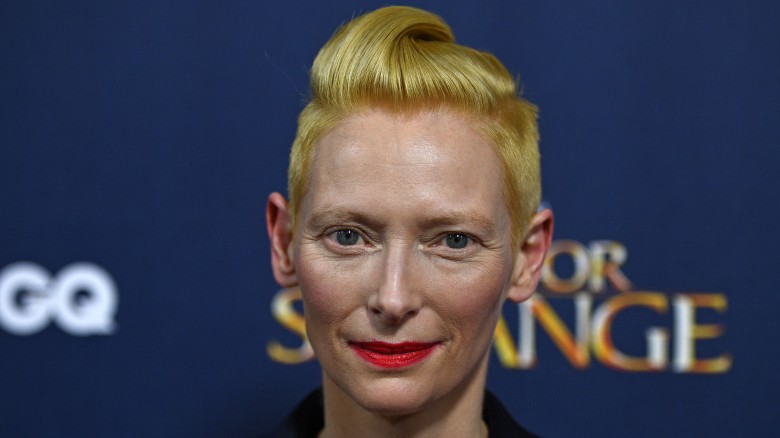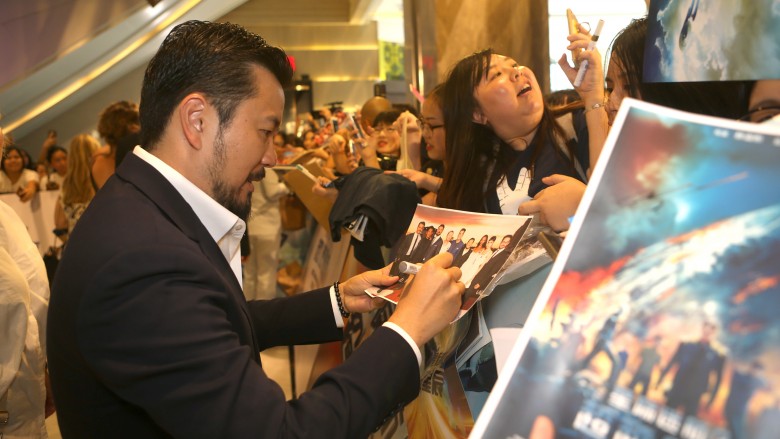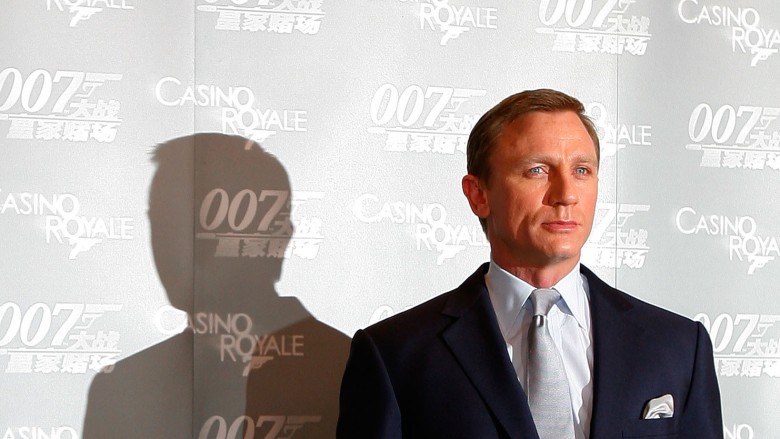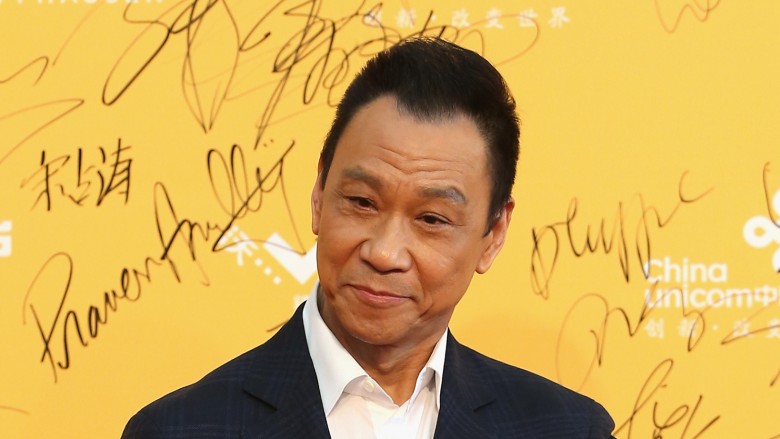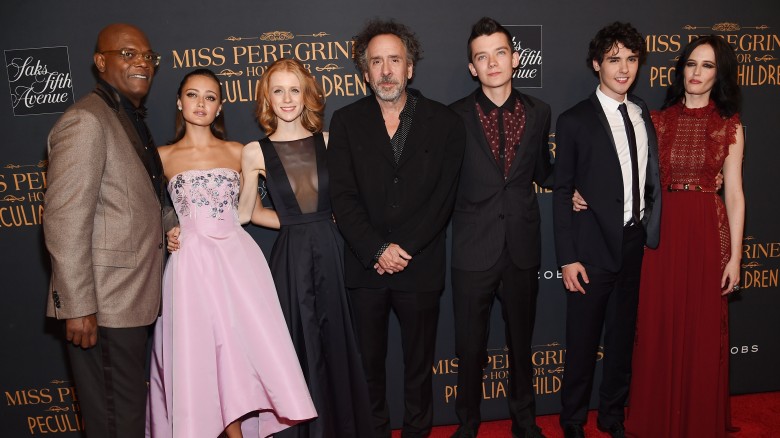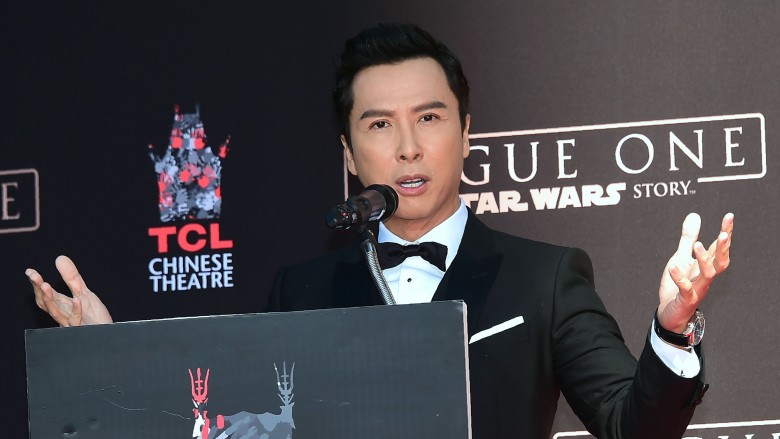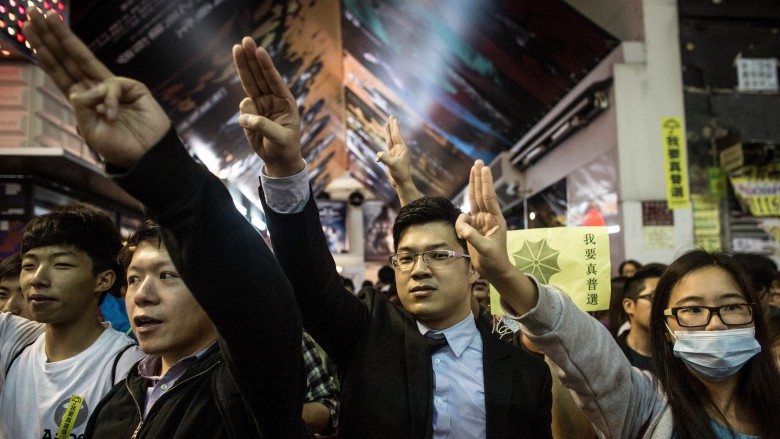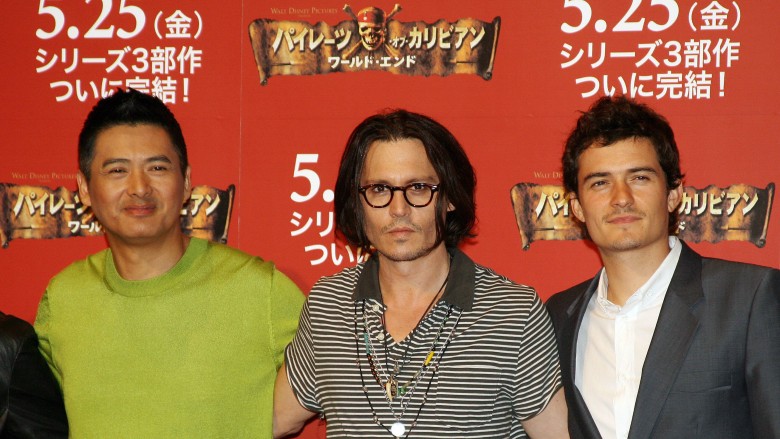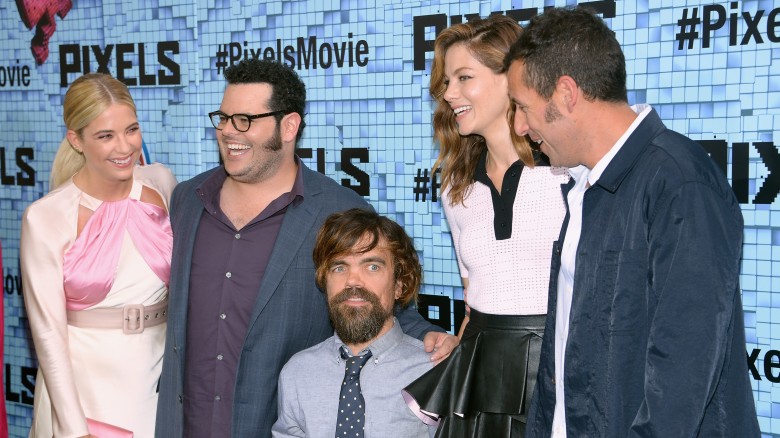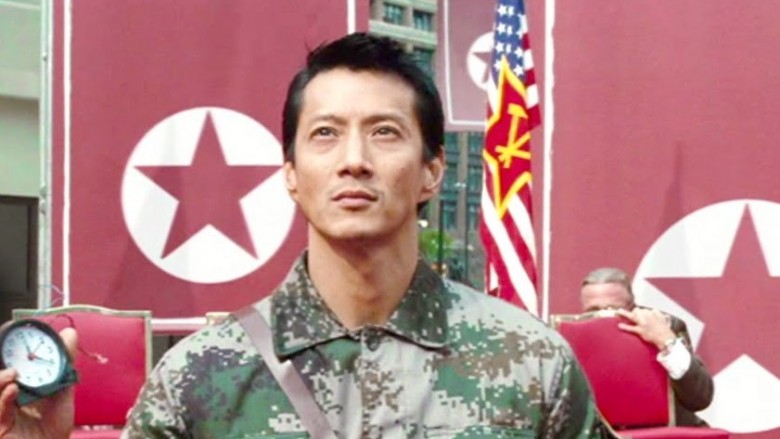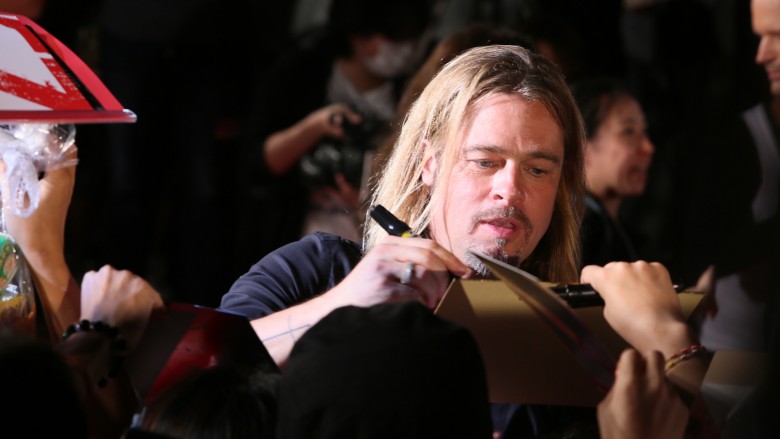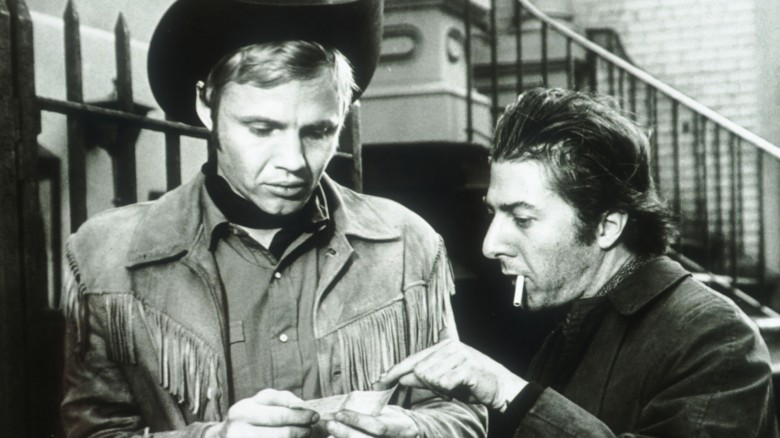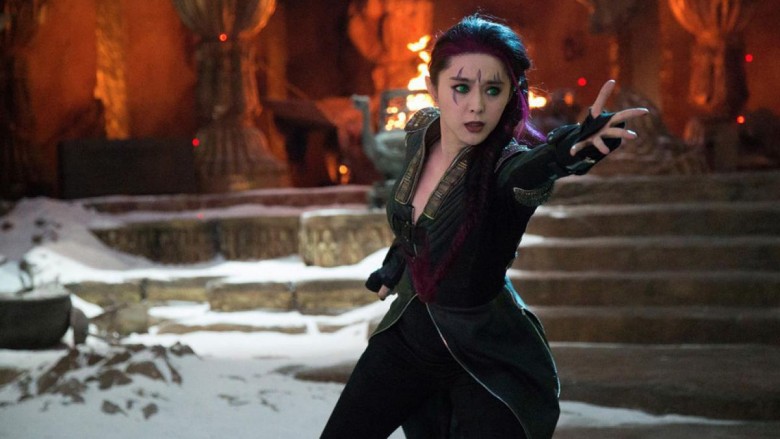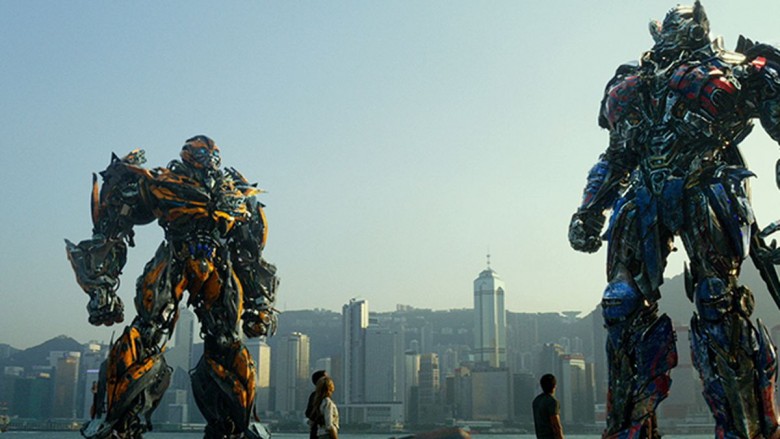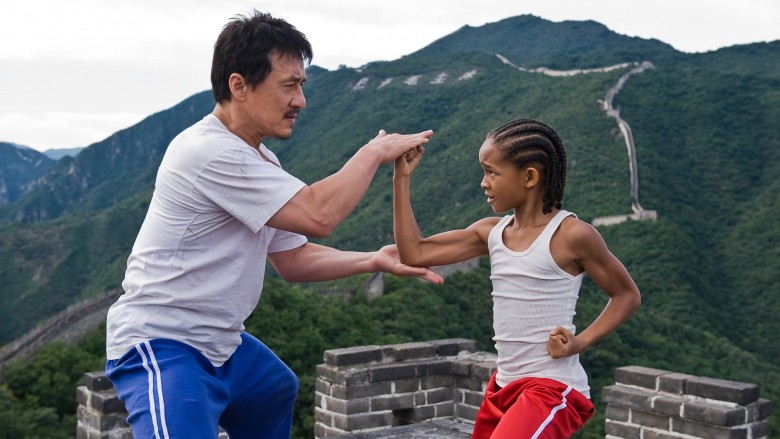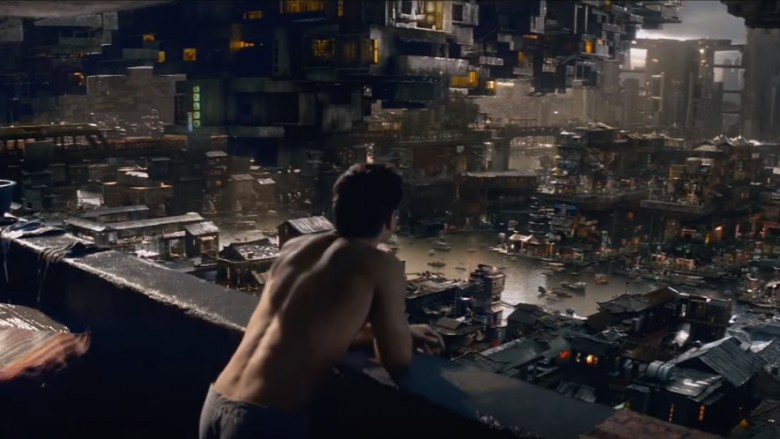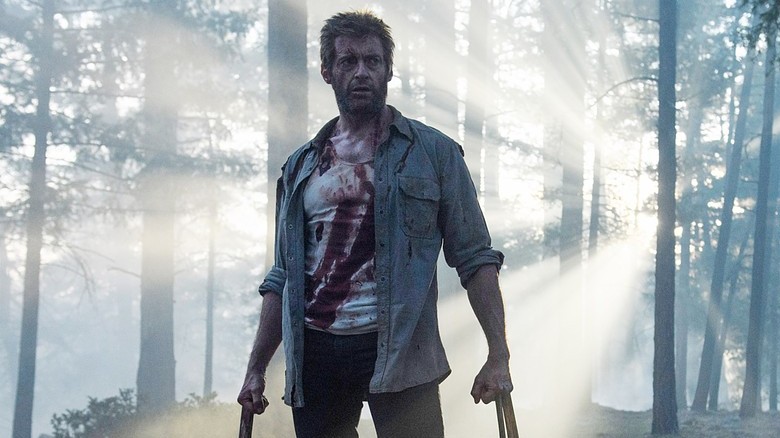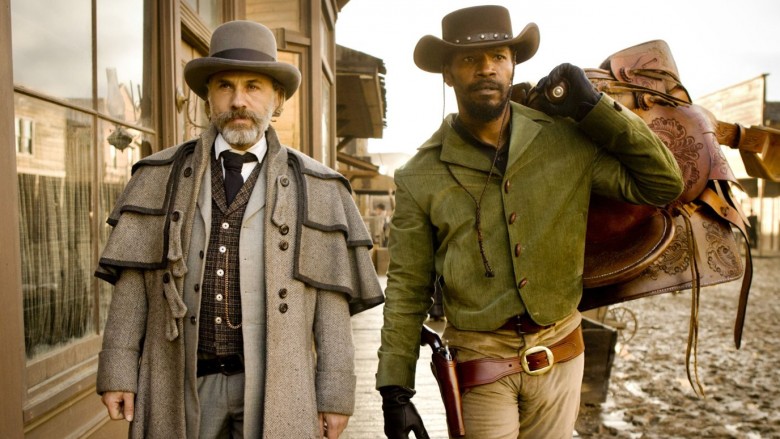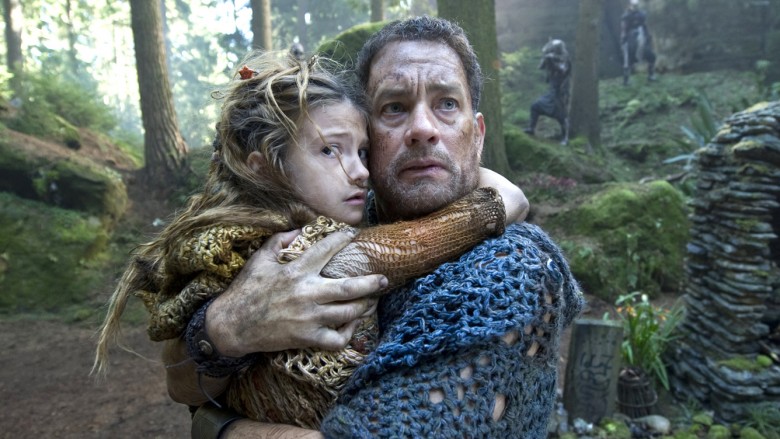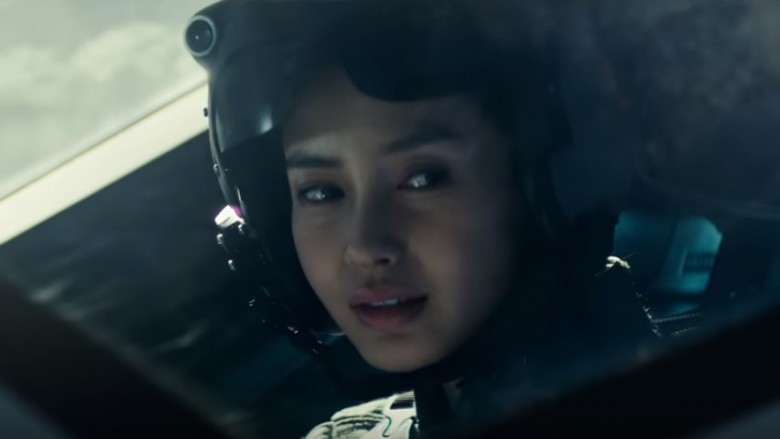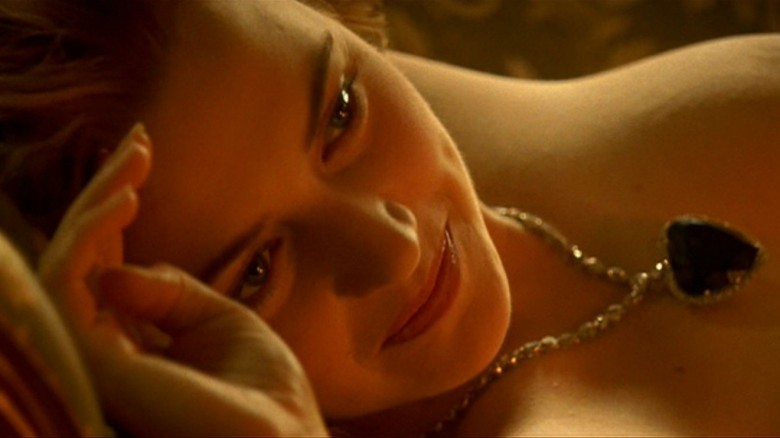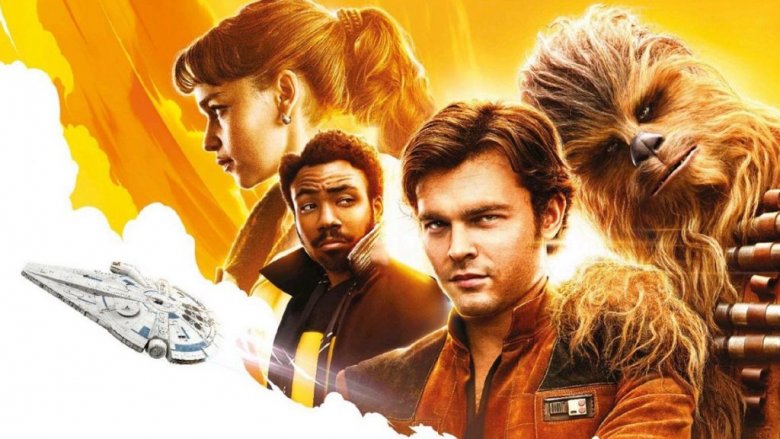Movies Hollywood Was Forced To Change For China
The particular needs of Chinese audiences were bumped up Hollywood's list of priorities in 2012, the year the nation officially surpassed neighboring Japan as the most lucrative source of foreign revenue for filmmakers. Analysts have predicted that China will overtake the USA in box office receipts as early as 2020, and American studios have been altering their tactics accordingly—some subtly than others. If you wondered why tech mogul Tony Stark was using a Vivo phone (a mid-range Chinese brand not even available in the United States) in Marvel's Captain America: Civil War, now you know.
Product placement is just the tip of the iceberg, however. China's current policy allows for a total of 34 Hollywood films to be released on the mainland each year, and as audience numbers continue to increase there, those slots are becoming increasingly coveted. In order to make the cut, studios have to...well, make cuts. Chinese censors are notoriously strict, and aren't shy about banning a movie outright if it doesn't meet their morality standards—as their recent refusal to screen DC ensemble Suicide Squad proved. The following movies all made the grade, though they were forced to make changes before they were shown in Chinese cinemas.
Doctor Strange (2016)
Whitewashing is nothing new in Hollywood, but the problem has come to a head in recent years with a spate of controversial against-race castings. The announcement that Scarlett Johansson would be taking the lead role in the blockbuster adaptation of classic Japanese anime Ghost in the Shell caused quite the stir, though one of the most high-profile instances of whitewashing had roots in Hollywood's blossoming relationship with Chinese moviegoers. Marvel came under fire when they revealed that Tilda Swinton had been cast in the role of the Ancient One in Doctor Strange, a character from the comic books who happened to come from a place that Chinese government officials refuse to recognize as an independent country. This presented a problem for the Disney-owned studio, as the film's co-writer C. Robert Cargill explained.
"The Ancient One was a racist stereotype who comes from a region of the world that is in a very weird political place. He originates from Tibet," said Cargill. "So if you acknowledge that Tibet is a place and that he's Tibetan, you risk alienating one billion people who think that that's bulls— and risk the Chinese government going, 'Hey, you know one of the biggest film-watching countries in the world? We're not going to show your movie because you decided to get political.'"
Star Trek Beyond (2016)
When J.J. Abrams decided it was time to distance himself from the Star Trek reboot after directing the first two films in the new timeline, Taiwanese helmer Justin Lin was brought in to replace him for Star Trek Beyond. Having previously directed four installments in the Fast and Furious franchise, it seemed inevitable that Lin would bring his patented brand of high-octane action to the revitalized sci-fi series, a style of film that studios have come to realize usually goes down well in China. The director admitted during Beyond's Asian press tour that he kept Chinese audiences in mind while making the movie, and he actually spent time with regular film fans in the country to find out what kind of pictures they liked.
"I talked to a lot of people on why they go to movies, what kind of movies they want to see," said Lin. "And the thing that I got back was that everyone here, such great people and they work so hard, and they want to get a sense of like to escape and to really kind of just enjoy, have fun, laugh and enjoy big action, and I feel like this movie is tailor-made for the Chinese audience."
Casino Royale (2006)
2006's Casino Royale made history as, after 20 previous attempts to get him there had proven unsuccessful, James Bond was finally introduced to China. When asked by a BBC reporter just how 007's violence and womanizing was dubbed passable by Chinese standards, star man Daniel Craig replied that "the only good thing is that we got it past the censors here and we're showing the film in its entirety." That's a claim that Craig's co-star Dame Judi Dench has refuted, however. The M actress laughed off claims that Casino Royale was being shown in its original form in China, revealing that she was called back to re-record some dialogue about the Cold War that the studio was worried might get Chinese backs up.
Bond encountered more problems when 2012's Skyfall was subjected to heavy editing at the hands of Chinese censors, who removed all references to torture tactics used by the Chinese authorities as well as cutting a scene in which a Chinese security guard is killed during an assassination. They decided to leave a scene in which Bond asks a Chinese casino hostess about child prostitution intact, though the Chinese subtitles deliberately misquote the secret agent, changing his question to one about connections to the mafia as opposed to trafficking.
Iron Man 3 (2013)
One of the most shameless attempts at a China cash grab in recent years, Marvel's Iron Man 3 was influenced by Hollywood's newest eastern audience in more ways than one—the first being the new take on Tony Stark's arch-nemesis. Even the staunchest fans of Marvel's comic books would find it hard to argue that the the Mandarin should have appeared in the Marvel Cinematic Universe true to his original form—a position shared by Iron Man 3 director Shane Black, who called the character a "racist caricature" of Asian villains. Needless to say, this kind of Fu Manchu stereotype would have offended countless viewers the world over, but it would have gone down particularly badly in China. With that box ticked, Marvel decided to go a step further in securing a big win at the Chinese box office.
The studio filmed a few scenes specifically for the Chinese release, cutting in four extra minutes of footage. The version released in Chinese cinemas opened with the question "What does Iron Man rely on to revitalize his energy?" The answer, we soon find out, is Gu Li Duo, a milk-based drink found on the shelves of Chinese convenience stores. A bottle is consumed by Dr. Wu (veteran Chinese actor Wang Xueqi), a throwaway character in the international cut who pops up several times in the Chinese version, performing acupuncture on Stark and having a conversation with his AI assistant J.A.R.V.I.S in Mandarin. The move backfired, however, with Chinese viewers seeing through the product placement and questioning the logic of Dr. Wu's relevance to the story.
Miss Peregrine's Home For Peculiar Children (2016)
The first Tim Burton film to secure a release in China was 2010's Alice In Wonderland, yet audiences were already aware of his extensive back catalogue thanks to increased access to the internet. Chinese actress Xi Qi revealed that she was a big Burton fan during the Miss Peregrine's Home For Peculiar Children premiere, telling reporters that she had "seen many of his classics online" and was "happy to have a chance to pay him back with film tickets." The movie she saw in her local theater was not the same one that played in cinemas around the rest of the world, however.
The scene in which the movie's nefarious villain Barron (Samuel L. Jackson) and his minions feast on gouged-out eyeballs was given the axe by Chinese censors, deemed too frightening for audiences there. In truth, Burton's dark fantasy did well to just suffer that one alteration, seeing as ghost stories are rarely allowed to be shown in China no matter the size of the production, as Universal Pictures discovered the hard way when Crimson Peak was rejected. This isn't because of cultural superstition as many in the west seem to believe, but harks back to a time when Chinese filmmakers circumvented rules against negative portrayals of politicians by showing them as ghouls.
Rogue One: A Star Wars Story (2016)
Hollywood movies weren't shown in China at all when the original Star Wars trilogy made waves domestically, and as a result, George Lucas' space opera just isn't very well known there, a fact that showed plainly in the Force Awakens box office takings. Episode VII's poor reception was clearly a cause for concern at Disney, who made moves to ensure that 2016's Rogue One: A Star Wars Story didn't suffer the same fate. Chinese stars Jiang Wen and Donnie Yen were hired in genuine supporting roles in an effort to drum up interest in the spinoff, and their inclusion created the intended hype. Hong Kong-born Yen (China's second biggest action star after Jackie Chan) initially refused the role of Chirrut Imwe over fears that his participation was just a marketing ploy, though director Gareth Edwards managed to convince him otherwise.
"When the director approached me, I began by asking, quite frankly, if it's a real character, or if he's only casting me based on commercial considerations for the [Chinese] market," Yen told the South China Morning Post. "Once he told me what my character was going to be like, and some of my lines, including the iconic 'May the Force be with you,' I recognized the importance of my character." Unfortunately, despite Edwards sticking to his word and even allowing Yen to choreograph his own action sequences, Chinese audiences just weren't buying it, and the film bombed there. Jonathan Papish from China Film Insider told TheWrap that "the small number of Donnie Yen or Jiang Wen fans who turned out to see their faces were completely confused or bored with the rest of the story."
The Hunger Games: Mockingjay - Part 1 (2014)
China insists that 14 of the 34 Hollywood films it approves for mainland screening each year must be presented in either 3D or IMAX, formats that have proven incredibly popular there after heavy investment in the technology. Lionsgate used this to their advantage when it came to releasing The Hunger Games: Mockingjay – Part 1 in China, hoping to improve upon the disappointing returns of previous installment, Catching Fire, which opened alongside Gravity in 2013 and was pummelled by the Oscar-winning space epic. The first part of the franchise finale was converted to 3D especially for China, and when it easily bested the previous films at the box office, Part 2 was given the same treatment.
Converting movies to 3D to make a few extra bucks doesn't always work out, however. The Bourne movies are well known for employing an excess of shaky-cam in their nauseatingly shot action sequences, yet Universal sought to milk fifth installment Jason Bourne for all it was worth and released a 3D version in China. The result was "a line of people throwing up in the restroom of the cinema," according to quotes from Chinese movie-goers obtained by Quartz. "Please don't offer 3D just to grab money anymore," another paying customer complained, "Chinese people are not stupid, we can vote with our feet and money."
Pirates of the Caribbean: At World's End (2007)
Disney responded to reports that the third film in the Pirates of the Caribbean franchise, At World's End, had suffered quite the cull at the hands of China's censors by admitting that there had been some cuts, but the Mouse House declined to elaborate further. Previous installment Dead Man's Chest didn't get a release at all thanks to its ghostly elements, so Disney were happy to part ways with a number of scenes in order to push the next film through, though surprisingly those scenes all involved Chow Yun-fat. The Hong Kong-born action star made his name at home collaborating with compatriot John Woo in several bloody cult flicks, later becoming known to western audiences when Ang Lee's Crouching Tiger, Hidden Dragon became the unexpected darling of the 73rd Academy Awards.
It seems strange that Chinese authorities would insist on scenes featuring one of their homegrown stars being removed from the film, though they were far from happy with Yun-fat's character Sao Feng. The pirate lord of the South China Sea appears in traditional Qing dynasty garb with a shiny bald head and long, dirty fingernails, an image censors in China found to be an offensive stereotype. Pivotal moments including Chow's reading of a poem by Tang dynasty poet Li Bai were pulled, making his sudden appearance in the final act very confusing to Chinese audiences according to a Beijing News report.
Pixels (2015)
When Sony was subject to a cyber attack from what many suspect were hackers acting on behalf of the North Korean government, a number of sensitive emails were dumped onto the internet for all to see. The leak revealed details of how the Adam Sandler comedy Pixels was changed for China: a line of dialogue mentioning a "Communist conspiracy" was given the axe, and a scene in which the country's beloved landmark the Great Wall comes under fire by the film's arcade-themed alien invaders was deemed surplus to requirements.
Li Chow, Sony's chief rep in China, told his stateside executives that "even though breaking a hole on the Great Wall may not be a problem as long as it is part of a worldwide phenomenon, it is actually unnecessary because it will not benefit the China release at all. I would then, recommend not to do it." Chow's recommendations didn't make a whole lot of difference in the end as, although China topped the league table of foreign box office receipts, the much maligned sci-fi comedy only pulled in $15 million there.
Red Dawn (2012)
At one stage it looked as though the planned remake of 1984 Cold War cult classic Red Dawn was going to be shelved, missing its 2010 release date after original studio MGM ran into financial difficulties. Contrafilm took the reins and the film finally got the green light for 2012, though even after the production wrapped, the problems were far from over. When Chinese news outlets learned that the Soviet army that waged war on small-town America in the original had been replaced by Chinese invaders, headlines such as "US re-shoots Cold War Movie to Demonize China" started to appear, and studio execs panicked about their chances in the Asian market.
A decision was made to change the invading Chinese army to a North Korean one, with five different special effects companies brought in to restore hopes of scoring big in China. They were given the unenviable task of removing all references to a country that was essential to the plot, digitally altering dialogue and replacing every Chinese flag and symbol. Dan Mintz from Chinese-based distributor DMG Entertainment said that if Red Dawn had been released in its original form in China, "there would have been a real backlash. It's like being invited to a dinner party and insulting the host all night long."
World War Z (2013)
Considering that World War Z spent years in development hell (Paramount decided to rewrite and reshoot the last 40 minutes of the film, forcing last-minute casting calls and adding an estimated $75 million to its already sizable budget), you wouldn't think the studio would have time to worry about trivial things like where the offending virus originated. As you've probably guessed by now, the zombie outbreak that ultimately consumes the world in World War Z was supposed to start in China, though (much like Red Dawn) the offending state was changed to Hollywood's new favorite pariah North Korea, minimizing the risk of getting on the wrong side of the Chinese censors.
"It's not a huge plot point," a Paramount insider revealed in an exclusive with TheWrap. "But it's safe to say [the studio are] going to want a release there." In the end their re-shoots and nitpicking paid off in a big way, as Paramount were able to boast that World War Z ended up becoming Brad Pitt's highest-grossing film to date, failing to recoup its budget domestically but earning more than $540 million after worldwide receipts were tallied.
Midnight Cowboy (1969)
Homosexual content rarely gets by Chinese censors, and if it does, it's invariably watered down to the point of ambiguity. The state recently cracked down on gay characters on television as part of their drive to remove "vulgar, immoral and unhealthy content," and the same attitude is taken toward the movies. When Taiwanese director Ang Lee became the first Asian to win the Best Director Oscar for his gay cowboy romance Brokeback Mountain, news of his historic victory made the front pages in China, hailed as "the glory of Chinese cinematic talent" despite his Academy Award-winning movie being banned there.
This screening for homosexuality is nothing new, however. Long before China became such a lucrative market for Hollywood there were still a few films that made it to the mainland, one of which was Dustin Hoffman's homoerotic classic Midnight Cowboy. A Chinese-Malaysian man was able to recall seeing a heavily censored version of the film at the time, and it didn't help doubts he was having about his sexuality: "The first thing about homosexuality that I remember making an impact on me was the movie Midnight Cowboy. It made me more confused than ever. I didn't speak English and trying to read the subtitles in Chinese, I didn't know what was going on. It was very badly edited for Chinese audiences."
Looper (2012)
Traditionally, movies about time travel are a no-go in China, as authorities are often overly cautious about how their country will be represented—though in the case of Looper, they made an exception because Endgame Entertainment struck a deal with Beijing-based distributor DMG before the film entered production, allowing them to circumnavigate the foreign movie rules and get their picture screened on the mainland during a Hollywood blackout period. The move proved financially sound right off the bat: Looper made $20.8 million in its first weekend in the United States but brought in close to $24 million in Chinese receipts according to Endgame's estimates, making it the first film to have a better opening there than it did at home.
It wasn't as simple as signing on the dotted line with DMG, however. Things started to get sketchy when the Chinese State Administration of Radio, Film and Television told Endgame they had to meet specific regulations if they wanted official co-production status, meaning that at least one third of the financing, casting and shooting had to be done in China. According to China Uncensored, director Rian Johnson originally intended to set large parts of the movie in a dystopian version of Paris, though in order to appease their Chinese partners he was forced to change it to a future Shanghai and cast Chinese actress Summer Qing as Bruce Willis' wife to boot.
X-Men: Days of Future Past (2014)
X-Men: Days of Future Past cast Asian superstar Fan Bingbing to play teleporting mutant Blink, though describing her contribution as minor would be something of an understatement. With only a single line of dialogue ("we have to keep going"), it became clear that Bingbing was only brought on board as a sweetener to Chinese audiences, and Asian news outlets outside of China were not afraid to point that out—the Borneo Post compared her role to that of a "flower vase."
Judging by her reaction, Bingbing also had her own suspicions about the director's true motive when he came to her with the offer. "In the comics, Blink is a Caucasian girl, so I was curious why Bryan [Singer] wanted an Asian to play the role," she admitted though her translator. Regardless of her reservations, the actress saw the opportunity as one too great to pass up, especially as she believed she was being contracted to appear in the next four X-Men films. She was clearly mistaken, however, as she was nowhere to be seen in next installment X-Men: Apocalypse.
This wasn't Bingbing's first bad experience with Marvel, either. She also filmed a scene as the assistant of Dr. Wu for Iron Man 3, announcing Tony Stark's arrival with her one line. When this scene only appeared in the Chinese theatrical cut, it became clear that her presence was only required to squeeze a little more cash out of her cinema-going compatriots.
Transformers: Age of Extinction (2014)
Until 2014, James Cameron's CGI juggernaut Avatar was the highest-grossing film in the history of the Chinese box office, but Transformers: Age of Extinction set out to usurp it from the get-go, employing all the tricks in the book to make that happen. The film's climax was set in Hong Kong and, in a shrewd move, producers chose to hold the premiere in Hong Kong, closing the window of opportunity that bootleggers get to distribute pirated cam recordings taken at screenings in the US. But that was just the tip of the iceberg when it came to maximizing profit in China.
Chinese audiences are used to product placement by now, but seeing the things they buy in their weekly shop on screen in an American movie sometimes bemuses rather than amuses, as The Hollywood Reporter found out. The movie mag sent a reporter into a screening of the movie in China, where the influence of Hollywood could be seen firsthand—rich couples sat openly taking notes as the array of sports cars whizzed by on screen. Not every member of the audience was as eager to lap up the moments aimed directly at them, however.
Local water, soy milk and protein products all popped up in Shanghai and beyond, but when Chinese Red Bull and ATMs started appearing in Texas, viewers seemed puzzled. Some even laughed when a Hong Kong policeman tries to "call the central government" for help, a not-so-subtle attempt at reminding the world that Hong Kong remains loyal to China when in fact an independence movement has been growing there for some time.
The Karate Kid (2010)
The Jaden Smith-fronted remake of '80s classic The Karate Kid is really a remake in name only. The original featured a Japanese karate master living in the States (Pat Morita as the immortal Mr. Miyagi) who teaches an American boy (Ralph Macchio) how to kick ass with honor, whereas the new version takes place in China and, despite the title, hardly features any karate at all. Instead, the focus is on the Chinese martial art of choice—kung fu.
In the updated story, Smith and his mother are fleeing Detroit for a new life in China, and the film makes a point of proving their decision was the correct one. In its scathing writeup, The Guardian highlighted the ways in which the movie shamelessly panders to China, writing that Beijing is portrayed as "a glittering metropolis peopled by happy, healthy and sporty citizens who're treated as deferentially as their capital." It's here that Smith meets his mentor in Jackie Chan, who reluctantly takes the young foreigner under his wing and not only teaches him about China's fighting style, but about their rich culture, too.
With kung fu in his arsenal, Smith defeats his bullies and becomes a better person in the process, all thanks to China. The film veers unapologetically into tourism board territory at times, and feels totally different in tone to the original. In fact, at one stage, reports claimed that the title had been changed to The Kung Fu Kid to reflect the new plot, but in the end Karate Kid was just too bankable to drop, accuracy be damned.
Total Recall (2012)
Like The Karate Kid, the 2012 remake of Total Recall was a collaboration between Sony and the China Film Group, the government-affiliated body that are essentially the gatekeepers to the riches of the Chinese market. The two shared a good working relationship going into this Colin Farrell-led take on the '90s Schwarzenegger classic, and had planned to work together on a sequel to 2004 action comedy Kung Fu Hustle, though after they butted heads over a number of issues related to Total Recall that seems to have been put on the back burner.
The problems began with CFG objecting to the "New Asia" setting of the worker's colony, which (despite its very Chinese feel) was passed off as being in Australia instead so as not to paint China as a dingy metropolis at the bottom of the world. This, Chinese officials felt, would have been the image viewers got of their country, especially as the original name for the global elevator shaft that connects the United Federation of Britain with the colony was "The China Fall." This was also changed, with the "China" part of the name removed. Sony declined to comment on the revisions when approached by The Hollywood Reporter.
Logan (2017)
One of the latest Hollywood blockbusters to suffer a hack job at the hands of Chinese censors is Logan, the R-rated X-Men movie that blew everyone away with its bad language, visceral violence and partial nudity. Those are three red flags right there, and there was no way Logan was going to be allowed to be released across mainland China with such scenes intact. In the end, Fox agreed to cuts totaling 14 minutes of footage, chopping the runtime down to a little over two hours.
The critically acclaimed Wolverine movie was actually the first to be affected by a new law imposed on distributors stipulating that all marketing material had to feature age restrictions. Previously, Chinese censors edited films so they were suitable for consumption by all, which presented a number of problems—so they adopted a rating system similar to America's, and Logan was seen as the perfect place to start enforcing it.
According to China Film Insider, producers were "instructed that all online and offline point of sales for the film should prominently include the warning 'elementary school students and pre-school children must be accompanied by parents or guardians.'" The film was essentially given a PG rating after the cuts, meaning that the effect on revenue was minimum, as shown by its dominance at the Chinese box office over opening weekend.
Django Unchained (2012)
The will-they-won't-they saga surrounding the Chinese release of Quentin Tarantino's Django Unchained was finally settled in May 2013, when the bloody blaxploitation western finally opened on the mainland, a month later than originally intended. The movie actually started showing there on April 11 and was set to take up an estimated 17 percent of Chinese theater screens over the coming weekend, though we never got the chance to see what it truly would have earned, as censors abruptly pulled it from cinemas citing "technical reasons."
By the time those technical issues had been resolved and a new release date set, three minutes of footage had been removed from the film, including a killing spree on a plantation, a flashback in which a man is mauled by dogs, and a scene in which Jamie Foxx's Django and his wife (Kerry Washington) are tortured naked. These cuts were on top of those already made to the original in order for it to secure its first release date, and their decision to pull it in for a second haircut proved fatal for the film as far as the box office was concerned.
According to The Hollywood Reporter, the delay encouraged Chinese film fans to pirate Django en masse, with one frustrated blogger openly admitting that they illegally downloaded the picture after being denied the chance to see it in May. "Chinese film buffs are the most dismayed and helpless of all," they complained. "Even when we are watching dated movies we had our screenings stopped. Luckily, we still have pirated discs!"
Cloud Atlas (2012)
Warner Bros. would have known they were up for a battle if they wanted to get Cloud Atlas released in China when they bought the rights to it, as their adaptation of David Mitchell's multi-layered novel would include homosexuality if it was to remain true to its source material. One strand of the story follows a budding romance between Robert Frobisher (Ben Whishaw) and his Cambridge classmate Rufus Sixsmith (James D'Arcy), though this section was predictably excised from the Chinese cut, one of the "passionate love scenes" deemed too steamy for audiences according to a report in Shanghai-based publication Dongfang Daily.
The movie had a trio of directors presiding over it, with the Wachowski siblings of Matrix fame joined by Tom Tykwer (Run Lola Run). All three appeared defiant when asked about the changes made by Chinese co-producer Dreams of the Dragon Pictures, telling reporters in China that while there were undoubtedly "constraints" to releasing there, they trusted their Chinese partners to get it right. Beneath their polite grins, however, they were likely furious at the amount of scenes that had been given the axe—the version released there was a whopping 40 minutes shorter than they intended.
Independence Day: Resurgence (2016)
Gone are the days when the USA would single-handedly save the world from an extraterrestrial threat without even thinking about asking another nation for help—in this day and age, China has enough clout to play hero, too. In the sequel to 1996's Independence Day (which didn't get released in China and has zero nostalgia value there), the two world powers come together to save the world from annihilation as equals. It's a plot designed to pass Chinese censorship tests with flying colors, but as if that wasn't enough, Fox decided to sweeten the pie with a number of less-than-subtle attempts at pandering.
Audiences in China might not have been familiar with the original Independence Day, but they know director Roland Emmerich from his disaster epics The Day After Tomorrow and 2012, both of which did well at the Chinese box office. His name and that of Chinese pop star-turned-actress Angelababy (who plays a throwaway part as a Chinese pilot in the global space force) featured heavily in the promotional material, though what really had audiences cringing was the borderline insulting product placement.
Global Times reported that some Chinese moviegoers were getting increasingly fed up with Chinese products popping up in Hollywood movies, with Resurgence pegged as one of the biggest culprits. Not only does US pilot Jake Morrison (Liam Hemsworth) inexplicably use Chinese instant messaging service QQ, but a Chinese drink called Moon Milk features prominently, leaving perplexed viewers venting their frustrations online. "When getting revenge on evil aliens, everyone should take two boxes of MengNiu Moon Milk with them," one sarcastic Weibo user posted.
21 and Over (2013)
Writers of The Hangover Jon Lucas and Scott Moore decided they would take the reins themselves with 21 and Over, co-directing a comedy that revels in the raunchiness of college life in the States. At least, it does if you're outside of China. If you went to see 21 and Over in Beijing, the movie you saw had a very different message, one that isn't particularly flattering for U.S. colleges or America in general.
The plot revolves around three friends: two white Americans (Miles Teller and Skylar Astin) and one Chinese (Justin Chon). When Chon's 21st birthday party gets wildly out of control, he ends up being just as responsible for the events that unfold as his buddies, though in the Chinese cut the entire film is bookended with scenes showing Chon at a prestigious Chinese college. The extra scenes twist it so the events of film as we saw it actually took place during a stint as a transfer student—he leaves for the U.S., and, seeing that it's non-stop debauchery, returns to his school in China to live the life of a good student.
"21 and Over, in China, is sort of a story about a boy who leaves China, gets corrupted by our wayward, Western partying ways and goes back to China a better person," Lucas admitted, though the idea wasn't his. Relativity Media, the studio behind the movie, has been eagerly striking deals in China in an effort not to miss the gold rush.
Titanic 3D (2012)
China is no stranger to James Cameron classic Titanic, with the Best Picture winner having been screened on television there at various points over the years according to the numerous netizens who took to the web to complain about the differences between the version they saw then and the one released in 3D in 2012. The famous scene in which Kate Winslet disrobes so Leonardo DiCaprio can draw her like one of his French girls remarkably stayed intact for those broadcasts, but when it came to releasing the epic in 3D cinemas, the State Administration of Radio, Film and Television stepped in and removed as much breast as possible.
The first part of their statement was nothing new, claiming that the cuts were made to "avoid potential conflicts between viewers and out of consideration of building a harmonious ethical social environment," but it was what they said about Winslet's breasts in particular that had people talking, implying that they would be so irresistible in 3D that keeping them in there would have spoiled the movie experience: "Considering the vivid 3D effects, we fear that viewers may reach out their hands for a touch and thus interrupt other people's viewing."
Solo: A Star Wars Story (2018)
Hollywood trends come and go, but for American audiences, Star Wars has been king for more than 40 years — and the franchise's long streak of box office domination continued with the start of a new trilogy in 2015. The seventh installment in the series, The Force Awakens, unleashed a fresh torrent of stories from a galaxy far, far away — and in the U.S., they've all been wildly successful. Overseas, however, that hasn't necessarily been the case — particularly in China, where the franchise remained largely unseen during its initial run.
Without decades of fan frenzy to fall back on, the more recent Star Wars releases haven't really been blockbusters in China; when eighth installment The Last Jedi arrived in December of 2017, for instance, it was beaten at the box office by the third installment in a romantic comedy franchise. Given all that, it's easy to understand why execs at Disney and Lucasfilm weren't about to hedge their bets when it came to 2018's Solo: A Star Wars Story.
Solo, which offers a look at Star Wars rogue Han Solo's early years, continues the series of standalone "anthology" films that started with 2016's Rogue One. But that aspect of the movie's pedigree would have been largely lost on Chinese audiences who aren't as invested in the broader saga, so the studio took the somewhat unusual step of renaming the movie for screenings in the region, calling it Ranger Solo instead. While Solo is hardly the first film to undergo a name change overseas, it's unusual to see the franchise dropped completely like this — although as Hollywood grows more reliant on the Chinese box office, it's a practice that could become far more common.
